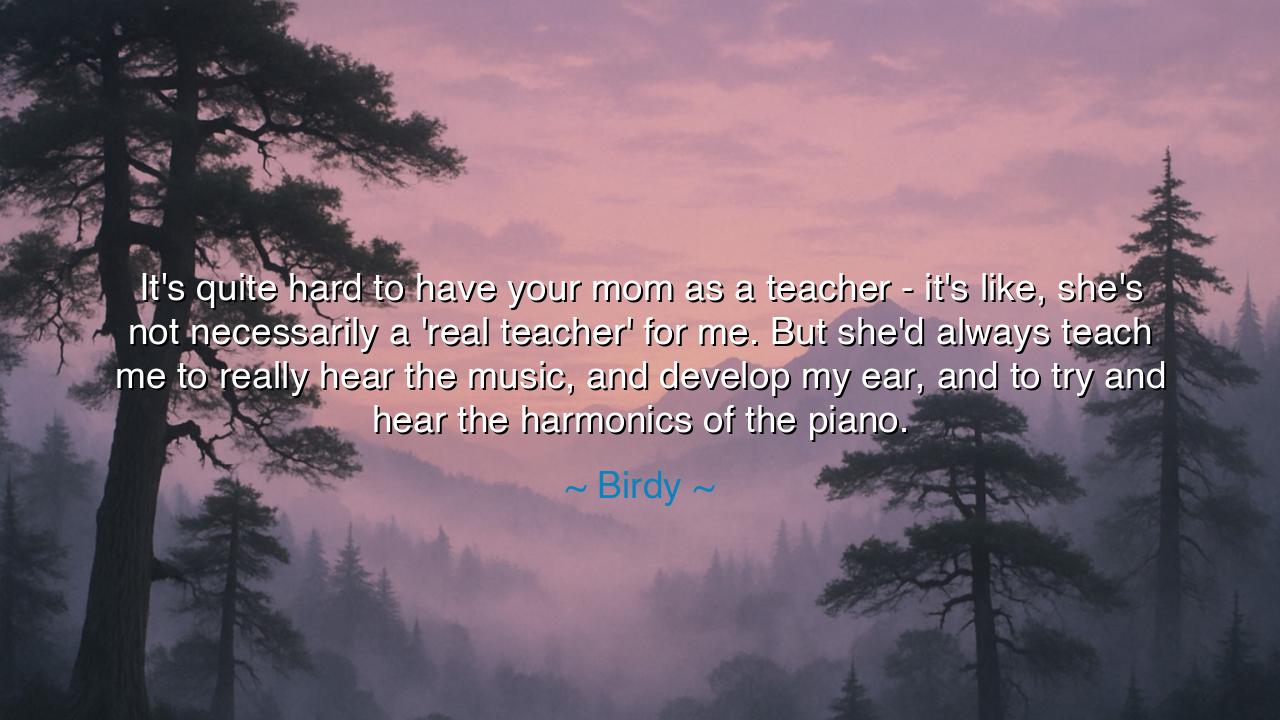
It's quite hard to have your mom as a teacher - it's like, she's
It's quite hard to have your mom as a teacher - it's like, she's not necessarily a 'real teacher' for me. But she'd always teach me to really hear the music, and develop my ear, and to try and hear the harmonics of the piano.






The words of Birdy—“It's quite hard to have your mom as a teacher - it's like, she's not necessarily a 'real teacher' for me. But she'd always teach me to really hear the music, and develop my ear, and to try and hear the harmonics of the piano”—speak with the intimate wisdom of one who has received lessons not only of skill but of the heart. They reveal the paradox of learning from a parent: the closeness of love mingled with the challenge of authority, the blurred line between family and instruction. Yet in this struggle lies a deeper truth—that the greatest lessons often come not from formal teachers, but from those who shape our earliest experiences with love and patience.
The origin of Birdy’s insight lies in the home, in the small, sacred space where music was passed from mother to daughter. Though her mother may not have been a “real teacher” in the institutional sense, she was a guide into the mysteries of sound. She did not simply teach notes on a page; she taught her child to hear the music, to listen beyond the obvious, to perceive the harmonics and hidden threads that make the piano sing. This is a teaching that transcends technique and touches upon wisdom itself: that truth lies beneath the surface, and only those who listen with the heart can discover it.
History is rich with such examples of parents who became their children’s first and most enduring instructors. Consider the story of Wolfgang Amadeus Mozart, whose father Leopold was not merely a parent but a mentor, guiding the boy through the intricate worlds of violin and composition. Though their relationship was often fraught with the difficulties of expectation, it was this early and intimate education that gave Mozart the foundation to astound the world. Birdy’s words echo this timeless pattern: that to be taught by one’s own mother or father is not easy, but it carries a power unlike any other, for it fuses blood with discipline, love with craft.
The emotional force of this reflection lies in its humility. Birdy admits the difficulty: a mother may not always seem like a “real” teacher, for authority feels different when it comes from one who has also soothed your tears and shared your table. Yet it is precisely this closeness that allows for deeper learning. A parent teaches not with lessons alone but with life itself. To learn music from a mother is to hear not only harmonics but also the harmonies of love, patience, and devotion that resonate through her voice and guidance.
There is something heroic in this teaching, too. For it demands that both teacher and student transcend the familiar roles of mother and child to enter into a sacred space of learning. The mother must be patient, gentle, and wise, knowing that her authority is challenged by the intimacy of family. The child must be humble, willing to receive instruction from one whose presence has always been taken for granted. When this balance is found, the lessons reach deeper than mere technique—they touch the soul, shaping not only skill but character.
The lesson for us is plain: we must not dismiss the teachers who are closest to us simply because they are familiar. Often we seek wisdom in distant sages, in famous masters, in great institutions, forgetting that those who raised us, those who share our lives, may hold the greatest keys to growth. To honor the teachings of a parent, a sibling, or a friend requires humility, but it is through such humility that we receive treasures hidden in plain sight.
What, then, shall we do? Let us listen more closely to the voices of those who guide us daily. Let us look past the comfort of familiarity and recognize the wisdom they offer. Let us, like Birdy, learn to “really hear the music” of life—not only the obvious notes, but the subtle harmonics that give meaning and depth. And let us, in turn, be willing to teach those around us with patience and love, even if we are not “real teachers” in the world’s eyes.
Thus, Birdy’s words endure as a reminder that teaching is not confined to the classroom, and that love often carries the deepest lessons. To learn from one’s mother is not always easy, but it is to drink from a well that is both ancient and intimate. And in the end, such lessons remain not only in the ear, but in the heart, shaping the music of one’s life forever.






AAdministratorAdministrator
Welcome, honored guests. Please leave a comment, we will respond soon